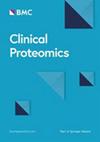Kinome and phosphoproteome reprogramming underlies the aberrant immune responses in critically ill COVID-19 patients
IF 3.3
3区 医学
Q2 BIOCHEMICAL RESEARCH METHODS
引用次数: 0
Abstract
SARS-CoV-2 infection triggers extensive host immune reactions, leading to severe diseases in certain individuals. However, the molecular basis underlying the excessive yet non-productive immune responses in severe COVID-19 remains incompletely understood. In this study, we conducted a comprehensive analysis of the peripheral blood mononuclear cell (PBMC) proteome and phosphoproteome in sepsis patients positive or negative for SARS-CoV-2 infection, as well as healthy subjects, using quantitative mass spectrometry. Our findings demonstrate dynamic changes in the COVID-19 PBMC proteome and phosphoproteome during disease progression, with distinctive protein or phosphoprotein signatures capable of distinguishing longitudinal disease states. Furthermore, SARS-CoV-2 infection induces a global reprogramming of the kinome and phosphoproteome, resulting in defective adaptive immune response mediated by the B and T lymphocytes, compromised innate immune responses involving the SIGLEC and SLAM family of immunoreceptors, and excessive cytokine-JAK-STAT signaling. In addition to uncovering host proteome and phosphoproteome aberrations caused by SARS-CoV-2, our work recapitulates several reported therapeutic targets for COVID-19 and identified numerous new candidates, including the kinases PKG1, CK2, ROCK1/2, GRK2, SYK, JAK2/3, TYK2, DNA-PK, PKCδ, and the cytokine IL-12.COVID-19重症患者异常免疫反应的基因组和磷酸蛋白组重编程基础
SARS-CoV-2 感染会引发广泛的宿主免疫反应,导致某些人患上严重疾病。然而,人们对严重 COVID-19 中过度但非生产性免疫反应的分子基础仍然知之甚少。在这项研究中,我们使用定量质谱法对 SARS-CoV-2 感染阳性或阴性的败血症患者以及健康人的外周血单核细胞(PBMC)蛋白质组和磷酸蛋白质组进行了全面分析。我们的研究结果表明,在疾病进展过程中,COVID-19 PBMC 蛋白质组和磷蛋白组发生了动态变化,其独特的蛋白质或磷蛋白特征能够区分纵向疾病状态。此外,SARS-CoV-2 感染会诱导激酶组和磷酸蛋白组的全面重编程,导致由 B 淋巴细胞和 T 淋巴细胞介导的适应性免疫反应缺陷、涉及 SIGLEC 和 SLAM 免疫受体家族的先天性免疫反应受损以及细胞因子-JAK-STAT 信号过度。除了发现由 SARS-CoV-2 引起的宿主蛋白质组和磷酸蛋白质组畸变外,我们的研究还重现了几个已报道的 COVID-19 治疗靶点,并确定了许多新的候选靶点,包括激酶 PKG1、CK2、ROCK1/2、GRK2、SYK、JAK2/3、TYK2、DNA-PK、PKCδ 和细胞因子 IL-12。
本文章由计算机程序翻译,如有差异,请以英文原文为准。
求助全文
约1分钟内获得全文
求助全文
来源期刊

Clinical proteomics
BIOCHEMICAL RESEARCH METHODS-
CiteScore
5.80
自引率
2.60%
发文量
37
审稿时长
17 weeks
期刊介绍:
Clinical Proteomics encompasses all aspects of translational proteomics. Special emphasis will be placed on the application of proteomic technology to all aspects of clinical research and molecular medicine. The journal is committed to rapid scientific review and timely publication of submitted manuscripts.
 求助内容:
求助内容: 应助结果提醒方式:
应助结果提醒方式:


